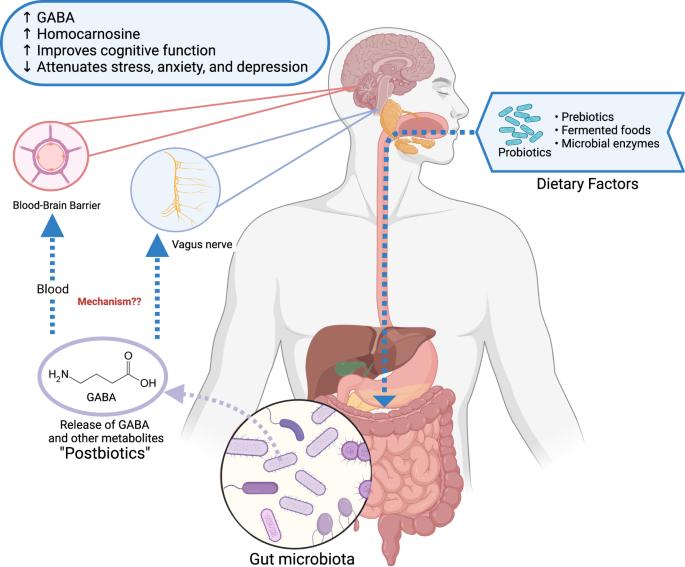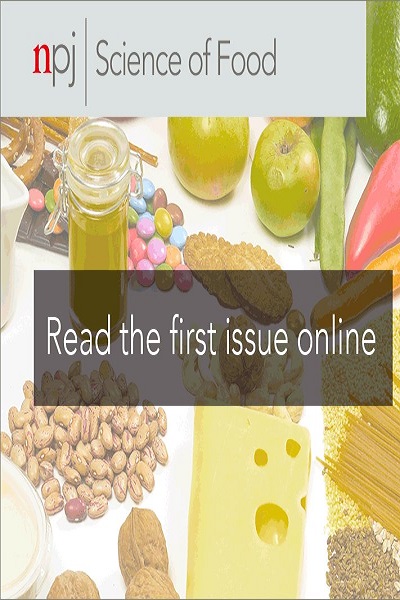γ-氨基丁酸是肠道-大脑轴中潜在的后生物介质
IF 6.3
1区 农林科学
Q1 FOOD SCIENCE & TECHNOLOGY
引用次数: 0
摘要
γ-氨基丁酸(GABA)作为一种抑制性神经递质,在中枢神经系统中发挥着至关重要的作用。这种神经递质的失衡与阿尔茨海默病和帕金森病等神经系统疾病以及焦虑、抑郁和压力等心理障碍有关。由于 GABA 长期以来一直被认为不能通过血脑屏障,因此循环中的 GABA 对大脑的影响被忽视。然而,新出现的证据表明,循环中和大脑中 GABA 水平的变化与肠道微生物群组成的变化有关,GABA 水平和微生物群组成的变化在调节心理健康方面发挥作用。最近的研究表明,GABA 可能是肠道-大脑轴的有效介质。这篇综述文章将介绍从人类肠道和食物来源中分离出的产生 GABA 的微生物的最新信息,解释这些微生物产生 GABA 的原因,诱导肠道-GABA 产生的食物因素,表明 GABA 是肠道微生物群与焦虑、抑郁、压力、癫痫、自闭症谱系障碍和注意力缺陷多动障碍等精神健康之间联系的介质的证据,以及有关高卡诺辛的新信息--高卡诺辛是一种主要的脑肽,是 GABA 调节大脑功能的推定下游介质。这篇综述将有助于我们了解肠道微生物群和 GABA-高肌肽代谢如何在大脑功能中发挥重要作用。不过,这也有助于进一步研究如何利用 GABA 生成诱导微生物和食物因子作为治疗神经和心理疾病的药物。本文章由计算机程序翻译,如有差异,请以英文原文为准。

Gamma-aminobutyric acid as a potential postbiotic mediator in the gut–brain axis
Gamma-aminobutyric acid (GABA) plays a crucial role in the central nervous system as an inhibitory neurotransmitter. Imbalances of this neurotransmitter are associated with neurological diseases, such as Alzheimer’s and Parkinson’s disease, and psychological disorders, including anxiety, depression, and stress. Since GABA has long been believed to not cross the blood–brain barrier, the effects of circulating GABA on the brain are neglected. However, emerging evidence has demonstrated that changes in both circulating and brain levels of GABA are associated with changes in gut microbiota composition and that changes in GABA levels and microbiota composition play a role in modulating mental health. This recent research has raised the possibility that GABA may be a potent mediator of the gut–brain axis. This review article will cover up-to-date information about GABA-producing microorganisms isolated from human gut and food sources, explanation why those microorganisms produce GABA, food factors inducing gut–GABA production, evidence suggesting GABA as a mediator linking between gut microbiota and mental health, including anxiety, depression, stress, epilepsy, autism spectrum disorder, and attention deficit hyperactivity disorder, and novel information regarding homocarnosine-a predominant brain peptide that is a putative downstream mediator of GABA in regulating brain functions. This review will help us to understand how the gut microbiota and GABA-homocarnosine metabolism play a significant role in brain functions. Nonetheless, it could support further research on the use of GABA production-inducing microorganisms and food factors as agents to treat neurological and psychological disorders.
求助全文
通过发布文献求助,成功后即可免费获取论文全文。
去求助
来源期刊

NPJ Science of Food
FOOD SCIENCE & TECHNOLOGY-
CiteScore
7.50
自引率
1.60%
发文量
53
期刊介绍:
npj Science of Food is an online-only and open access journal publishes high-quality, high-impact papers related to food safety, security, integrated production, processing and packaging, the changes and interactions of food components, and the influence on health and wellness properties of food. The journal will support fundamental studies that advance the science of food beyond the classic focus on processing, thereby addressing basic inquiries around food from the public and industry. It will also support research that might result in innovation of technologies and products that are public-friendly while promoting the United Nations sustainable development goals.
 求助内容:
求助内容: 应助结果提醒方式:
应助结果提醒方式:


